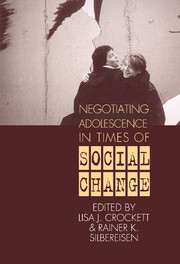Book contents
- Frontmatter
- Contents
- Contributors
- Preface
- 1 Social Change and Adolescent Development: Issues and Challenges
- Part I Models of Social Change Effects
- Part II Social Change and Adolescent Transitions
- Part III Social Change and Adolescents' Social Contexts
- Part IV Implications of Social Change for Adolescent Health and Well-Being
- Part V Interventions: Promoting Healthy Development in Times of Social Change
- Endnotes
- Index
Preface
Published online by Cambridge University Press: 26 January 2010
- Frontmatter
- Contents
- Contributors
- Preface
- 1 Social Change and Adolescent Development: Issues and Challenges
- Part I Models of Social Change Effects
- Part II Social Change and Adolescent Transitions
- Part III Social Change and Adolescents' Social Contexts
- Part IV Implications of Social Change for Adolescent Health and Well-Being
- Part V Interventions: Promoting Healthy Development in Times of Social Change
- Endnotes
- Index
Summary
The decline of the Socialist governments in Eastern and Central Europe and the resulting political and economic reorganizations of the 1990s provided a dramatic illustration of the far-reaching effects of social change. For social scientists interested in the health and well-being of youth, such instances of social upheaval raise questions of how young people are affected socially and psychologically by societal changes, and whether their development is compromised or enhanced. Further, if social change compromises development, the additional question arises as to what can be done to sustain healthy development in times of social change. The answers to these questions have important implications for our future in a global community because the youth of today are the adults of tomorrow. As we stand on the brink of a new century and take stock of the old one, addressing these questions seems especially timely. This was the impetus for the present volume.
In February 1996, a diverse group of social scientists (psychologists, sociologists, and anthropologists) from Germany, the United Kingdom, and the United States convened at the Pennsylvania State University to discuss the ways in which social change may affect adolescent development, the likely consequences for adolescent functioning and well-being, and the kinds of social interventions needed to support healthy development in a changing society. Entitled “Negotiating Adolescence in Times of Social Change,” the conference was organized to consider the abrupt and more gradual social changes affecting Western industrialized countries. Drawing on the ecological and life course perspectives, we were especially interested in the processes through which societal changes exert an impact on (1) the course of adolescent development and (2) adolescents' social and psychological adjustment.
- Type
- Chapter
- Information
- Negotiating Adolescence in Times of Social Change , pp. xi - xiiPublisher: Cambridge University PressPrint publication year: 1999



